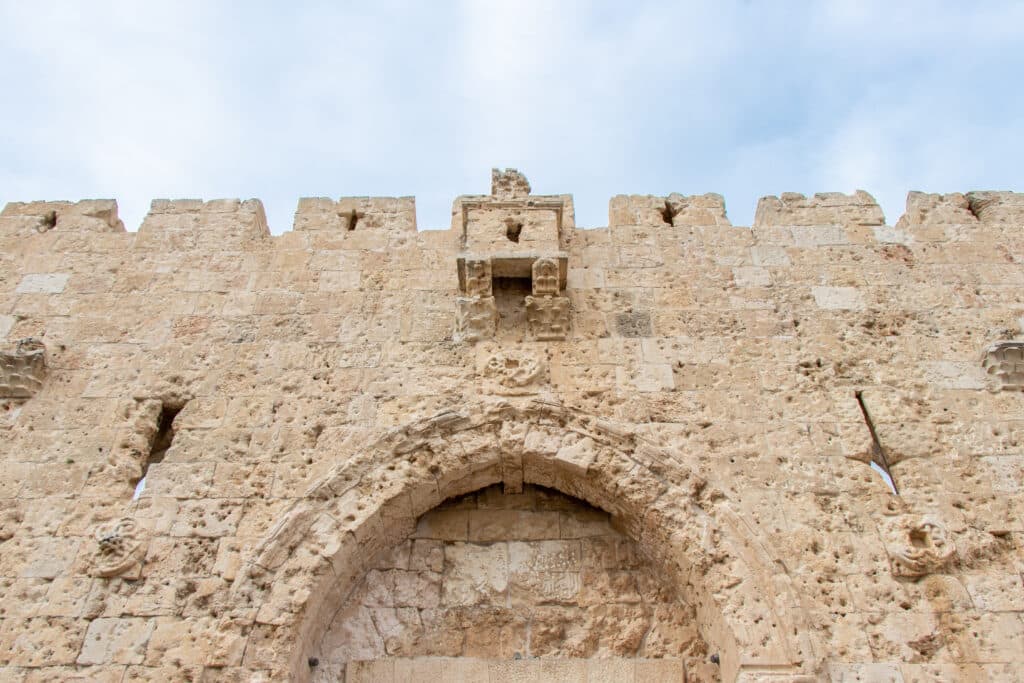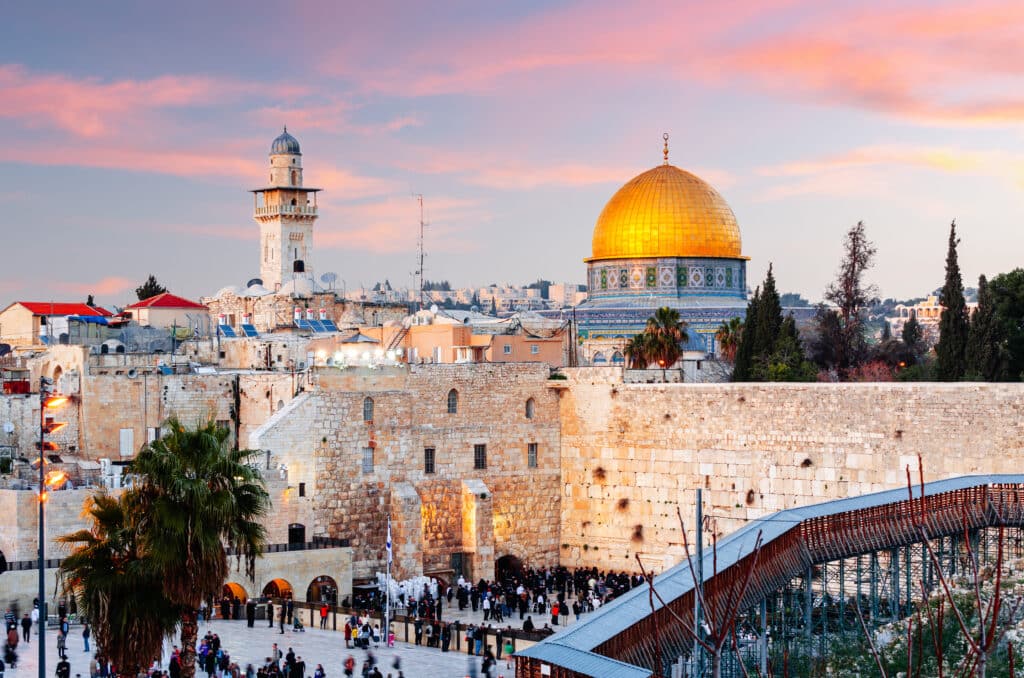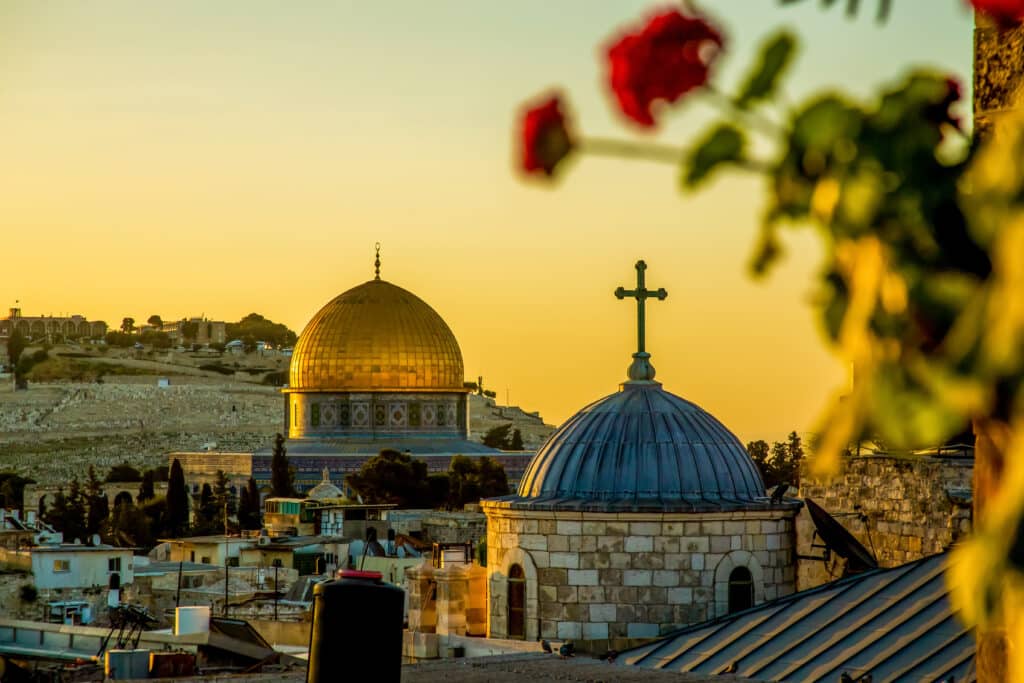Zion in Hebrew
Rooted in the Hebrew Scriptures, Zion originally referred to a specific geographical location but evolved to symbolize the presence of God and the spiritual heart of Israel.
The term “Zion” (צִיּוֹן, pronounced Tziyon in Hebrew) holds a profound significance both in the Bible and today. “Zion” (צִיּוֹן, pronounced “Tziyon”) means “a sign” or “a landmark.” The root צ-י-ן forms a verb in modern Hebrew today that means “to point out.”
Today, the concept of Zion extends to the modern political movement known as Zionism. It seeks the establishment and support of a Jewish state in the historical land of Israel.
Biblical Significance of Zion
The word “Zion” first appears in the Bible in 2 Samuel 5:7, where David captures the fortress of Zion. That is why we know it as the City of David. This early reference is purely geographical, identifying a stronghold in ancient Jerusalem. However, as biblical narratives progress, Zion takes on deeper theological meanings.

Mentions of Zion in the Bible
The term “Zion” appears 152 times in the Old Testament. It appears predominantly in the books of Psalms, Isaiah, and Jeremiah. Here are a few key references:
- Psalms: Zion is frequently mentioned in the Psalms as a place of God’s presence and glory (e.g., Psalm 2:6, 9:11, 14:7).
- Isaiah: The prophet Isaiah often uses Zion to symbolize Jerusalem and the people of Israel, highlighting both their suffering and future redemption (e.g., Isaiah 1:27, 2:3, 52:1-2).
- Jeremiah: Zion in Jeremiah is depicted as a place of lament and future hope (e.g., Jeremiah 3:14, 31:6).
Geographical and Historical Context
Initially, Zion was a physical location—part of the Jebusite city conquered by King David. This fortress became the nucleus of the city of Jerusalem, and the term “Zion” began to encompass the entire city, especially the Temple Mount area. Significant verses highlighting Zion include:
- “Nevertheless, David captured the fortress of Zion—which is the City of David.” 2 Samuel 5:7
- “Beautiful in its loftiness, the joy of the whole earth, like the heights of Zaphon is Mount Zion, the city of the Great King.” Psalm 48:2

2 Samuel 5:7 – David Captures the Fortress of Zion
The context of 2 Samuel 5:7 lies in the period when David was consolidating his rule over all Israel. After the death of Saul, David was anointed king over Judah. Eventually, he became the king over all Israel.
One of David’s first significant military campaigns as king was the capture of Jerusalem. At the time, it was a strategically located city that was controlled by the Jebusites.
The Jebusites and Jerusalem
The Jebusites were a Canaanite tribe inhabiting Jerusalem, which was known as Jebus before David’s conquest. The city was well-fortified, making it a significant stronghold in the region.
Capturing Jerusalem was crucial for David because of its central location. This meant it was an ideal political and religious capital for unifying the northern and southern tribes of Israel.
David’s Conquest
2 Samuel 5:6-7 describes David’s approach to Jerusalem and his successful capture of the fortress of Zion:
“The king and his men marched to Jerusalem to attack the Jebusites, who lived there. The Jebusites said to David, ‘You will not get in here; even the blind and the lame can ward you off.’ They thought, ‘David cannot get in here.’ Nevertheless, David captured the fortress of Zion—which is the City of David.”
The passage highlights the confidence of the Jebusites in their fortress’s impregnability, but David’s forces were able to overcome the defenses. This victory was a turning point, marking the beginning of Jerusalem’s transformation into the political and spiritual center of Israel.
Significance of the City of David
The capture of the fortress of Zion, later referred to as the “City of David,” marked the establishment of David’s dynasty in Jerusalem.
David’s choice of Jerusalem as his capital was politically astute. By making Jerusalem the capital, David established a neutral site that did not belong to any particular tribe, further promoting national unity.
Psalm 48:2 – The Joy of the Whole Earth
Psalm 48 is a song of Zion, celebrating Jerusalem as the city of God and extolling its beauty and divine protection. The psalm reflects the spiritual significance of Zion as more than just a physical location—it is the dwelling place of God and a source of joy and inspiration for the entire world.
The Description of Zion
“Beautiful in its loftiness, the joy of the whole earth, like the heights of Zaphon is Mount Zion, the city of the Great King.” (Ps 48:2)
This verse poetically empasizes the beauty and significance of Mount Zion. The reference to “the heights of Zaphon” draws a parallel with the mythical mountain, which symbolized divine presence and grandeur in Canaanite tradition.
By comparing Zion to Zaphon, the psalmist elevates Jerusalem’s status in the eyes of the people, portraying it as the preeminent city blessed by God.
Zion as the City of the Great King
The phrase “the city of the Great King” underscores the belief that Jerusalem is not just the political capital but also the spiritual heart of Israel. It is the place where God, the Great King, resides among His people.
This divine association adds to the city’s sanctity and importance.
Zion in the Psalms
Throughout the Psalms, Zion is frequently depicted as the locus of God’s presence and the focal point of His redemptive plans. Psalm 48, in particular, celebrates God’s protection and the city’s enduring stability. These attributes that are directly tied to the fact that God dwells in Zion.
“As we have heard, so we have seen in the city of the Lord Almighty, in the city of our God: God makes her secure forever.” Psalm 48:8
This verse reassures the faithful of Zion’s divine protection, reinforcing its role as a symbol of God’s eternal covenant with Israel.
The Dual Nature of Zion
The passages in 2 Samuel 5:7 and Psalm 48:2 provide a deep insight into the dual nature of Zion. Namely, it is both a historical fortress captured by King David and a spiritual symbol of divine presence and protection.
David’s conquest of the Jebusite stronghold marked the beginning of Jerusalem’s central role in the history and faith of Israel. Over time, Zion became synonymous with God’s dwelling place, the city of the Great King, and the source of spiritual joy and hope for believers.
This layered understanding of Zion reflects its enduring significance in both the historical narrative of Israel and its spiritual legacy.
Spiritual Symbolism
As mentioned previously, beyond its physical implications, Zion represents God’s dwelling place among His people. This is evident in several Psalms and prophetic writings, where Zion symbolizes divine presence and favor:
- “For the Lord has chosen Zion, he has desired it for his dwelling, saying, ‘This is my resting place for ever and ever; here I will sit enthroned, for I have desired it.'” Psalm 132:13-14
- “Here am I, and the children the Lord has given me. We are signs and symbols in Israel from the Lord Almighty, who dwells on Mount Zion.” Isaiah 8:18
Messianic Hope and Eschatological Vision
Additionally, in prophetic literature, Zion often represents the ultimate hope for Israel. It is a place of redemption and divine rule. The prophets saw Zion as the center of a restored Israel where God’s kingdom is fully realized. Notable passages include:
- “In the last days the mountain of the Lord’s temple will be established as the highest of the mountains… The law will go out from Zion, the word of the Lord from Jerusalem.” Isaiah 2:2-3
- “I will make the lame my remnant, those driven away a strong nation. The Lord will rule over them in Mount Zion from that day and forever.” Micah 4:7
From Biblical Zion to Modern “Zionist”
As we’ve established, Zion has deep religious and spiritual significance. It’s deeply linked to God’s presence, the holy city of Jerusalem, and the people of Israel.
While still rooted in the historical and cultural significance of the land, modern Zionism is a movement focused on nation-building and statehood.
For believers, Zion remains a powerful symbol of faith, divine promise, and spiritual heritage. For non-believers (or its critics), the term “Zionist” can evoke negative images. The term is often used to describe political conflict, nationalistic fervor, and contentious debates over land and identity.
Zionism: the Modern Movement
The term “Zionism” emerged in the late 19th century as a movement aimed at establishing a Jewish homeland in what was then known as Palestine.
(At the time, the term Palestine was associated with the Jewish people. The land was part of the Ottoman Empire, and later, it was controlled by the British.)
The Zionist movement was a response to widespread antisemitism and pogroms in Eastern Europe and Russia, inspiring Jews to return to their ancestral homeland.

Theodor Herzl and the Birth of Political Zionism
Theodor Herzl, often considered the father of modern political Zionism, published “Der Judenstaat” (“The Jewish State”) in 1896. In it, he advocated for the establishment of a Jewish state as a solution to the Jewish question in Europe.
Herzl organized the First Zionist Congress in Basel, Switzerland, in 1897. There, the Basel Program was adopted, proclaiming the goal of establishing a “home for the Jewish people in Palestine secured by public law.”
Biblical Zion vs. Political Zionism
While biblical Zion represents spiritual and eschatological ideals, political Zionism focuses on tangible, political objectives.
Nevertheless, the two share common ground in the aspiration for a Jewish homeland. This notion is clearly evident in the Bible.
Thus, for many, the return of the Jewish people to Zion is seen as a fulfillment of biblical prophecy. It aligns spiritual beliefs with nationalist goals.
As such, the term remains controversial. The Israeli-Palestinian conflict is an ongoing issue within Zionist discourse. Critics argue that Zionism has led to the displacement of Palestinian Arabs, while supporters emphasize the historical and existential necessity of a Jewish state.
Key Developments in Zionism
- Balfour Declaration (1917): The British government expressed support for “the establishment in Palestine of a national home for the Jewish people.” It was a significant diplomatic victory for Zionism.
- UN Partition Plan (1947): The United Nations proposed the partition of Palestine into Jewish and Arab states. This led to the establishment of the State of Israel in 1948.
- Modern Zionism: Today, Zionism encompasses a broad spectrum of beliefs, from secular nationalism to religious Zionism. Both advocate for the security and development of the State of Israel.
Zion Then and Now
One could argue that Zionism has transformed the ancient longing for Zion into a political movement that has successfully established a Jewish state.
Understanding Zion requires a nuanced appreciation of its historical, theological, and political dimensions, recognizing both the profound aspirations it represents and the complex realities it encompasses today.
Whether viewed as a divine promise or a nationalist ideal, Zion continues to inspire and challenge. It embodies the hopes and struggles of a people bound by a common heritage and vision for the future.
Articles Related to The Meaning of the Hebrew Word “Zion”
Estimated reading time: 9 minutes
